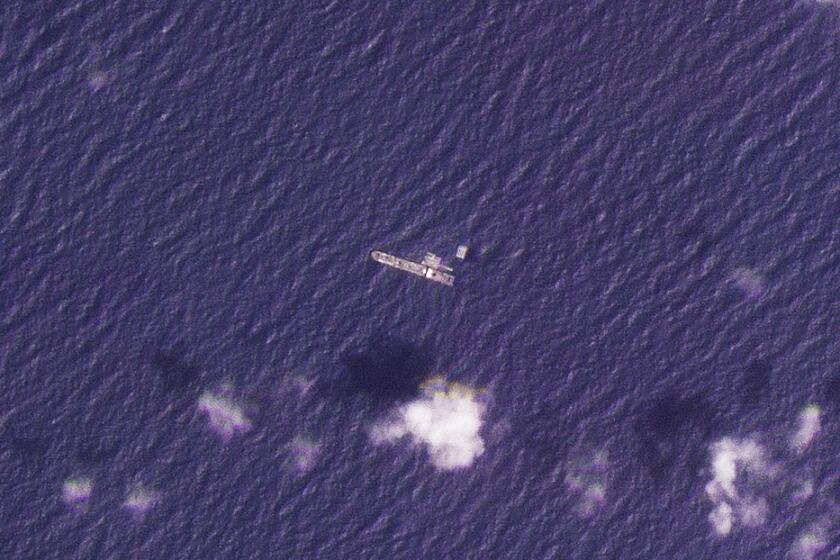Insurgents Endanger Mosques, U.S. Military Warns Iraqis
The message Monday was about mosques, and it appeared to be a tough sell.
Marines and soldiers distributed leaflets in this farming village outside the encircled city of Fallouja asking residents to keep insurgents from using the local mosque for meetings or to store weapons.
Included in the message was a warning: If insurgents shoot at U.S. forces from mosques, the buildings will lose their protected status and will be fired on.
As the possibility looms of a full assault on Fallouja, the U.S. has redoubled its efforts to deal with the sensitive political and cultural dilemmas of insurgents operating out of mosques.
Many of Fallouja’s more than 100 mosques are atop hills and have tall minarets, offering perfect vantage points from which sharpshooters can rain down bullets on an advancing force.
“We want to respect their culture and we don’t want to interfere with their religion, but the mosques have become safe havens for terrorists,” said Marine Lt. Michael Scott, 26, of Boston.
Convincing Iraqis not to allow insurgents to use mosques is proving difficult. Persuading them that damage to the mosques would be the fault of insurgents is equally challenging.
“The people don’t seem to like our message,” said Army Cpl. Ron Vaughn, 21, of Sarasota, Fla., one of several troops handing out the 3-by-5 leaflets. “They read it and shake their heads.”
Even as the fliers were being distributed, a Humvee radio crackled with a message from Marines inside Fallouja to commanders on the outskirts: “People are massing at the mosque here, shots are being fired” at the Americans.
Troops from the 2nd Battalion, 1st Regiment of the 1st Marine Division have established a foothold in the northwestern section of Fallouja after days of intermittent fighting. Overlooking the Marines’ position is a neighborhood mosque.
“It’s a big piece of terrain,” said Scott. “If we held it, it would make our job easier, but it’s not worth damaging our relationship with the good people of Fallouja.”
Marines have had several firefights with insurgents in or near mosques. In the early days of the battle for Fallouja, the U.S. called in an airstrike on 30 to 40 insurgents inside a mosque in the eastern section of the city. The strike put a crater in the plaza outside the mosque, and the insurgents apparently escaped.
Marines have used Arabic interpreters to ask religious figures not to allow the mosques be used. Some have complied; others, either because of coercion or sympathy, have allowed anti-American messages to be spread through the powerful public-address systems in the minarets.
U.S. forces are aware that pictures of damaged mosques could cost popular support even if the military battle is won. Damaged mosques could reinforce insurgent propaganda that the U.S. is bent on destroying Islam.
“It’s a very touchy issue,” said Army Sgt. Jeremy Douglas, 26, of Fort Bragg, N.C. “It would be as if somebody back home blew up a church.”
The military has also dropped leaflets by aircraft on Fallouja.
“Our message is that the misuse of protected places changes their status,” said Lt. Col. Gregg Olson. “We’re telling the people of Fallouja, ‘Don’t let the terrorists misuse your holy places.’ ”
And if the people do not heed that message?
“We are prepared to deal with the misuse of protected places,” Olson said.
More to Read
Start your day right
Sign up for Essential California for news, features and recommendations from the L.A. Times and beyond in your inbox six days a week.
You may occasionally receive promotional content from the Los Angeles Times.






